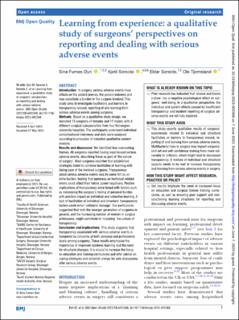| dc.contributor.author | Øyri, Sina Furnes | |
| dc.contributor.author | Søreide, Kjetil | |
| dc.contributor.author | Søreide, Eldar | |
| dc.contributor.author | Tjomsland, Ole | |
| dc.date.accessioned | 2023-06-12T09:06:31Z | |
| dc.date.available | 2023-06-12T09:06:31Z | |
| dc.date.created | 2023-06-07T21:41:15Z | |
| dc.date.issued | 2023-06 | |
| dc.identifier.citation | Øyri SF, Søreide K, Søreide E, Tjomsland, O. (2023) lLearning from experience: a qualitative study of surgeons’ perspectives on reporting and dealing with serious adverse events. BMJ Open Quality 2023;12:e002368. | en_US |
| dc.identifier.issn | 2399-6641 | |
| dc.identifier.uri | https://hdl.handle.net/11250/3070910 | |
| dc.description.abstract | Introduction In surgery, serious adverse events have effects on the patient journey, the patient outcome and may constitute a burden to the surgeon involved. This study aims to investigate facilitators and barriers to transparency around, reporting of and learning from serious adverse events among surgeons.
Methods Based on a qualitative study design, we recruited 15 surgeons (4 females and 11 males) with 4 different surgical subspecialties from four Norwegian university hospitals. The participants underwent individual semistructured interviews and data were analysed according to principles of inductive qualitative content analysis.
Results and discussion We identified four overarching themes. All surgeons reported having experienced serious adverse events, describing these as part of ‘the nature of surgery’. Most surgeons reported that established strategies failed to combine facilitation of learning with taking care of the involved surgeons. Transparency about serious adverse events was by some felt as an extra burden, fearing that openness on technical-related errors could affect their future career negatively. Positive implications of transparency were linked with factors such as minimising the surgeon’s feeling of personal burden with positive impact on individual and collective learning. A lack of facilitation of individual and structural transparency factors could entail ‘collateral damage’. Our participants suggested that both the younger generation of surgeons in general, and the increasing number of women in surgical professions, might contribute to ‘maturing’ the culture of transparency.
Conclusion and implications This study suggests that transparency associated with serious adverse events is hampered by concerns at both personal and professional levels among surgeons. These results emphasise the importance of improved systemic learning and the need for structural changes; it is crucial to increase the focus on education and training curriculums and offer advice on coping strategies and establish arenas for safe discussions after serious adverse events. | en_US |
| dc.language.iso | eng | en_US |
| dc.publisher | BMJ Publishing Group | en_US |
| dc.rights | Navngivelse-Ikkekommersiell 4.0 Internasjonal | * |
| dc.rights.uri | http://creativecommons.org/licenses/by-nc/4.0/deed.no | * |
| dc.subject | kirurgi | en_US |
| dc.subject | pasientsikkerhet | en_US |
| dc.title | Learning from experience: a qualitative study of surgeons’ perspectives on reporting and dealing with serious adverse events | en_US |
| dc.type | Peer reviewed | en_US |
| dc.type | Journal article | en_US |
| dc.description.version | publishedVersion | en_US |
| dc.rights.holder | © Author(s) 2023 | en_US |
| dc.subject.nsi | VDP::Medisinske Fag: 700::Klinisk medisinske fag: 750 | en_US |
| dc.source.journal | BMJ Open Quality | en_US |
| dc.identifier.doi | 10.1136/bmjoq-2023-002368 | |
| dc.identifier.cristin | 2152881 | |
| dc.relation.project | SHARE - Centre for Resilience in Healthcare: 5091 | en_US |
| cristin.ispublished | true | |
| cristin.fulltext | original | |
| cristin.qualitycode | 1 | |

